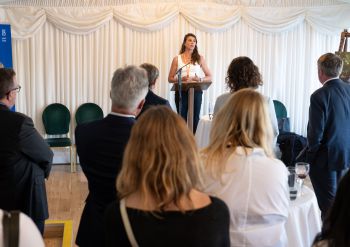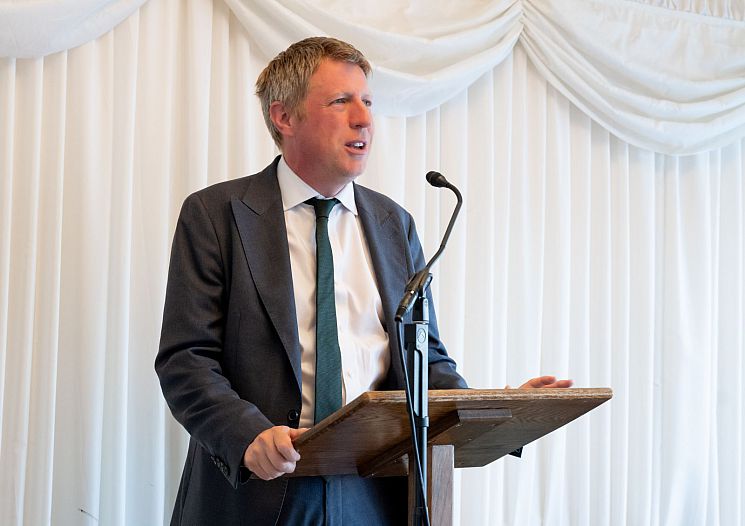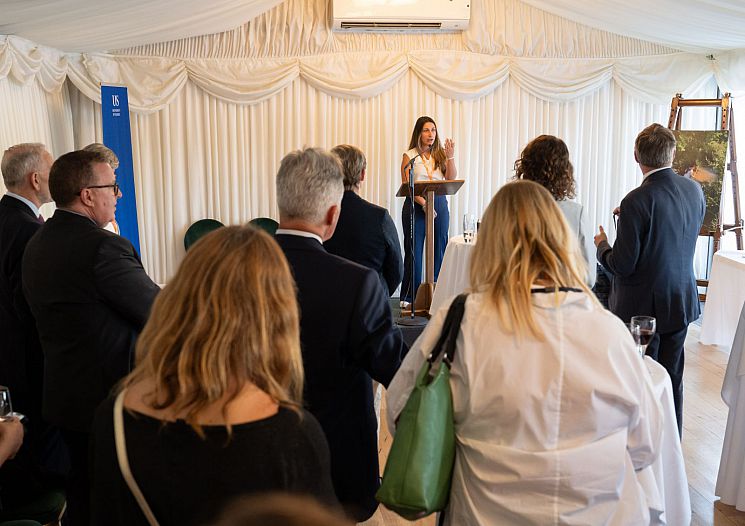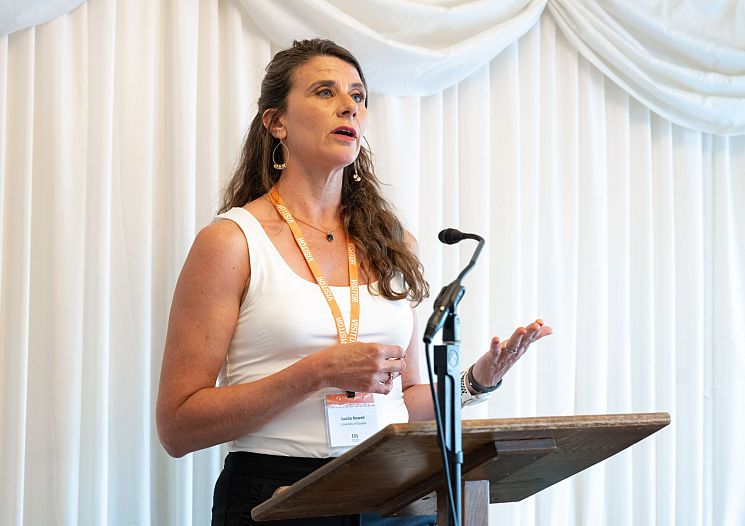Sussex Sustainability Research Programme waterway research makes a splash in parliament
By: Edwin Gilson
Last updated: Wednesday, 25 June 2025

Dr Lucila Newell shares her research at the reception
A parliamentary reception in the House of Commons showcased the strong policy potential of Sussex Sustainability Research Programme (SSRP) research restoring inland and coastal waters on the South Coast.
At the reception on June 18, which was hosted by the MP for Lewes James MacCleary, SSRP researchers shared findings, impact, and policy ‘asks’ relating to their projects addressing coastal biodiversity and river pollution in Sussex.
Fittingly, the event took place in the Thames Pavilion room, with over 40 attendees including MPs, policymakers, researchers, and members of partner organisations enjoying drinks and canapes on the balcony overlooking the famous river.
The reception was especially timely in light of the Water Act 2025, which enables regulators to take stronger action against water companies that damage the environment, and introduces measures to improve transparency within the water sector. The recent Interim Report of the Independent Water Commission also found that ‘fundamental change is needed to reset the water sector in England and Wales’.
As James MacCleary MP said in his speech, local communities including his Lewes constituents are ‘very, very angry’ about the state of UK rivers. The plight of marine ecosystems is also in the collective consciousness after the recent David Attenborough documentary Ocean.
At the event, two SSRP researchers – Dr Valentina Scarponi (School of Life Sciences) and Dr Lucila Newell (School of Global Studies) – highlighted how their work monitoring waterways in two sites in the South East can contribute to new policies and the strengthening of existing legislation.

James MacCleary, MP for Lewes, at the reception
Introducing the reception, Mr MacCleary said: ‘We are a coastal community here in Sussex, there is water all around us, and people are shocked to find these environments are being polluted on a daily basis. I’m really interested in your academic findings and privileged to host you all. Academics are doing the hard work to find out what is happening to our waterways.’
Mr McCleary said he had recently held a workshop with the ‘bright and fantastic’ members of the Politics Society at the University of Sussex. ‘One thing young people care and talk about a lot is our local environment and the condition of local waterways,’ he added, ‘whether it is sewage or microplastics or the impact of overfishing’.
Dr Valentina Scarponi then introduced her project ‘Documenting the Recovery of the Sussex Inshore Ecosystem,’ on which she works with PhD student Alice Clark and Professor Mika Peck, which monitors marine life off the Sussex coast since a trawling ban in 2021. Dr Scarponi said there is ‘no better moment for this discussion’, as the research team are ‘riding a wave of public awareness.’
She said that her project was a ‘testament to what can be achieved when people unite to preserve ecosystems’, referring to the ‘much more sustainable picture’ in the 300 kilometres of Sussex coast her team have monitored since the trawling byelaw came into place. She praised the ‘tireless’ work of the Sussex Inshore Fisheries and Conservation Authority (IFCA) in the implementation of the byelaw.
Dr Scarponi welcomed the government’s commitment to restore 30 per cent of seas by 2030, but said this target must be supported by ‘swift and decisive action’. She concluded by echoing a recent House of Lords call for a robust framework to deliver monitoring of Marine Protected Areas (MPAs), while also ensuring support and compensation for small-scale fishers affected by trawling bans.
‘We ask the UK to fulfil its potential to become a global leader in ocean conservation,’ said Dr Scarponi. ‘After all, nature has a right to be protected’.

Dr Valentina Scarponi presents at the reception
Dr Lucila Newell then discussed her project ‘Ripple Effect: Advancing Waterway Resilience’ (with Dr Ellen Rotheray and Professor Peck), which uses a community-based ‘citizen science’ approach to inspect pollution and biodiversity levels in the Upper River Medway. The project is a collaboration between the Sussex research team, local organisation Friends of the River Medway, and trained volunteers.
‘Ripple Effect’ has already made a significant impact, Dr Lucila Newell said, as their inspection of one particularly polluted site on the Upper River Medway has led to 24/7 monitoring by the Environment Agency. The project is a ‘response to the water crisis we face today,’ said Dr Newell, adding that ‘no rivers are in good health in the UK because of widespread pollution and poor regulation and enforcement.’
In 2024, a record 3.6 million hours’ worth of sewage was dumped into rivers and seas by water companies in the UK, according to an estimate from the Environment Agency, with dire consequences for ecological and human health.
Dr Newell described the Water Act as a ‘really good start’, but said she wanted to encourage monitoring that includes citizen science and democratic governance of water. She said that volunteers on her project had forged a closer connection to their natural environment as a result of their work. She called for greater investment in real-time monitoring, asking MPs and policymakers to use their power to work within constituencies to support local action.
‘Our rivers are the lifeblood of the country,’ concluded Dr Newell. ‘With your support, we can ripple that effect across the country. Let’s protect our rivers not just for today, but for generations to come’.

Dr Lucila Newell at the reception
Reflecting on both talks, SSRP Director Professor Joseph Alcamo drew attention to the ‘data gap’ which presents an obstacle to action on water restoration. He called on the government to support continuous monitoring of MPAs to gain a clearer picture of ecosystem health and water quality.
He also reiterated the value of citizen science in increasing the public awareness and visibility of these issues, and by extension holding polluting water companies to account. Professor Alcamo said that the University of Sussex is ‘deeply committed to sustainability in our community and all of the UK’, and that scientists can contribute vital evidence for policies which revive coastal areas.
He concluded by providing three policy ‘asks’, drawn from the Dr Scarponi and Dr Newell’s presentations and research:
- To boost protection levels of all Marine Protected Areas.
- To increase support for monitoring of rivers and Marine Protected Areas.
- To especially support citizen science in monitoring efforts.
Rounding off the reception, University of Sussex Vice-Chancellor Professor Sasha Roseneil thanked the project partners, citizen scientists and Sussex alumni who attended.
She said that Sussex has a well-earned reputation for sustainability, pointing to the University’s position of 8th in the UK and 26th in the world in the QS World University Rankings 2025, and that Sussex researchers are ‘at the forefront of high-impact research for people and planet’.
The reception was the catalyst for a close engagement between SSRP researchers and policymakers, working towards the mutual goal of improving waterway conditions. To combine quotes from Dr Scarponi and Dr Newell’s presentations, the aim is for this ripple to become a wave.

